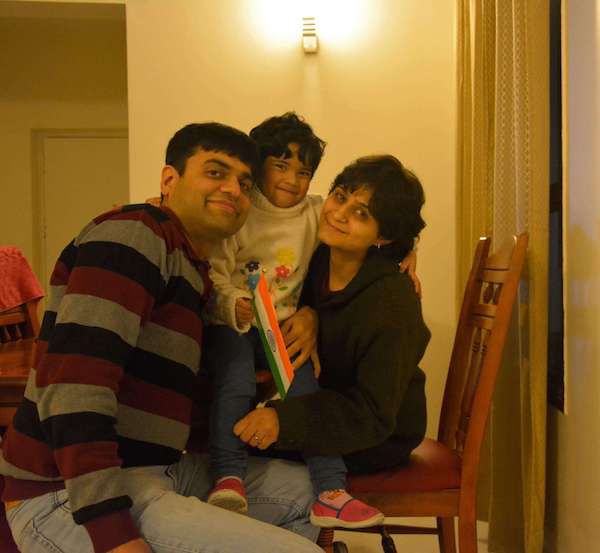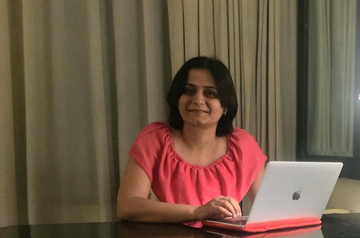Ladies, Here's Why You Need To Invest In Yourself
My name is Deepti and I stand for freedom for myself and for everyone.
If that sounds like a strange introduction, I must tell you that I just attended a rigorous 9-day residential program of India Leaders in Social Sector (ILSS) at Ashoka University.
In one of the sessions on Transformational Leadership, we were asked, what is that one thing that we stand for, which will give us happiness? We can bring happiness to the lives of others and to ourselves based on what we truly stand for. My answer was freedom.
I am the Chief Commercial Officer at SHEROES and will soon turn 44. The ILSS program is a capsule for leaders of corporate sectors who intend to crossover to the social sector or work with social enterprises. It is one of the many programs that I have done over the years. Some of them were pure online courses and others were classroom ones.
Since I am writing this especially for women, I would like to share that I invest money and most importantly my time, in learning, skilling and meeting people from whom I can learn. Doing ILSS meant staying away from family and work. To do a program, which is important to me but not a pressing requirement of my current job and does not even remotely help my family - I call all of this an ‘investment in oneself’.
“What we learn becomes a part of who we are.”
Back in 2015, I was a CFO at an internet company. I had been in that role for almost 3 years right from its start-up to growth stage, but I had started to feel saturated. I discussed with the seniors that I would want to phase out and look for a new role over the next 3-4 months. Some of them understood that it wasn’t about the organisation but that I wanted to do more.
By then, I had done Finance for 17 years of my career and I wanted to do something more than Finance. Incidentally, the organisation went through restructuring and I was offered to lead a business vertical and oversee supply chain.
Working as a CFO means having an overview of the whole business. But I would admit that to understand intricacies and to lead functional teams, required me to learn more. I started reading about the functions in our context, learning from the teams who were reporting to me, I started depending on deeper analytics to learn faster and ensure that the business performs better.
I connected with some industry mentors to understand how they were solving the same problems. I was learning from people 15 years younger and 10 years older than me. I wasn’t even looking for a vertical growth, but I realised that lateral growth is the best thing that can happen to professionals. The varied knowledge helps you build as a wholesome professional.
“As you grow old, you’ve got to learn more.”
It also takes me back to 2011. I was on a sabbatical, working from home and doing flexible assignments when my daughter was young. My 7-month-old daughter used to sleep for almost 10-12 hours in a day.

Deepti with her family
To use this time best, and also to update myself, I enrolled myself for a Diploma in IFRS. I started attending classes on weekends, as my husband was around to look after our daughter. I was 36, most people in the class were younger than me but I got a good score of 70/100.
“Risk comes from not knowing what you are doing.” - Warren Buffett
I am reminded of 2006 when I was on another sabbatical. My health wasn’t, but the stock market was doing well. I had all the time. First I did a brief program on stock trading to understand the fundamentals and then started killing my time by making bucks on the Stock Exchange. Secretly, I didn’t want weekends because the stock market was closed these two days and I wasn’t a salaried person.
“The expert in anything was once a beginner.”
And then in 2001, I was in between jobs. ERP was the new thing and the industry needed functional leaders to do ERP implementations. I thought of doing a brief course in ERP. Being a CA, I had sound foundation around processes and accounting controls, however, I needed to know how enterprise applications, functional and technical interfaces worked.
I got selected for a job which required someone to be a functional leader in Oracle Financials. The fact that I had done a course, helped me in getting that job. In a few weeks of taking up that role, I found myself rolling, I could understand tech jargons, functional and technical requirements, customizations and server configurations. In my career, I did two Oracle and one SAP implementation, alongside other roles of Finance.
These are some of the examples, where I did classroom training. I keep doing online programs as well.
At SHEROES, we receive tons of queries from women on how to return to work from sabbaticals, how they are not being considered for the next promotion, how the younger staff is able to succeed and the middle managers are struggling. I would like to share a few pointers, which I have learnt from my career and from the people around me:
1. Technology is and will continue to disrupt every industry, none of us can escape redundancy. Men or women, who will keep investing in learning and skilling, will have better chances of keeping up with the changes. Don’t wait for your organisation to make those investments, those could be too little or too late.
2. Women keep looking for free courses/programs, some of which don’t add much value. I would suggest you to undertake paid programs. The payback period may be two years and not the next month. Our parents made that investment in our careers for 20 years, why should we not make those investments in ourselves?
3. Often the question is - what should we be training ourselves in? I would say that first of all, make sure you are equipped to excel in your current job, invest in upskilling yourself. Then learn the skills around something that you would want to do. Don’t do something because everyone is doing it. My sister-in-law is 46-year-old supply chain management professional, but invests her weekends in learning Art. Who knows she will have an Art Gallery in the next couple of years.
4. The best people to learn from are those bunch of young grads in our own organisations. Most often we will find them more enthusiastic to help us, and also find ourselves hesitant to admit that we need to learn from them.
5. Sabbaticals are just phases and in many ways, are the best times of our lives. Those are the times to introspect about what you would want to do, bring some discipline, learn new skills, make new friends and mentors and visit new places. I recommend more and more women (and men), to spend those months in upgrading and learning new skills.
Write some promises to yourself and don’t forget to write #InvestInYourself. If you don’t invest in yourself, you have no investments.
What are your thoughts about this article? Do let us know in the comments. If you have questions or doubts regarding the next move in your career, join our Career Guidance community and talk to our mentors.
















